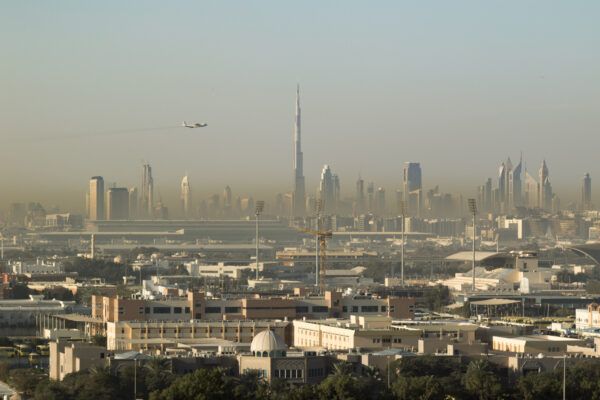Today for the first time, health was promised centre stage in climate negotiations at COP28 in Dubai. The first-ever dedicated Health Day brought together over 50 Ministers of Health to join their climate counterparts. This unprecedented combined meeting provided an opportunity that World Health Organization (WHO), health workers, researchers and NGOs have long-called for.
At the opening of Health Day, with Dr Tedros from WHO, US Presidential Climate Envoy John Kerry, Bill Gates, and the IEA’s Fatih Birol, Clean Air Fund CEO Jane Burston reminded the audience that air pollution now causes over 8 million deaths worldwide every single year – more than the toll taken by COVID-19 over the last four years. Of the victims of air pollution every year, over half a million are babies and children, whose developing lungs, hearts, and brains are especially vulnerable to toxic soot and fumes. Every day, 1,000 newborns die because the first breaths they take are so toxic.
COP28 has delivered three major health announcements
First, a joint Climate and Health political declaration has been endorsed by 124 governments. It is significant that the declaration gathered support from the national level – not only Ministers of Health and Climate, but national governments. This declaration will anchor health’s place in future climate negotiations. It will help this year’s engagement by over 60 Ministers of Health and countless health organisations become the norm. This will add much-needed urgency and perspective to climate negotiations. As Dr Maria Neira, WHO Director for Climate, Environment and Health, has repeatedly emphasised at COP28, “Governments will no longer be able to say ‘they didn’t know’ – success in climate negotiations will not only be counted in terms of greenhouse gas emissions, but in terms of human lives.”
As well as noting the benefits of lower air pollution, the declaration from the day emphasises the need to better leverage synergies between climate and health financing and encourages the “scaling up of investments in climate and health from domestic budgets, multilateral development banks, multilateral climate funds, health financing institutions, philanthropies, bilateral development agencies and private sector actors.” This is very well aligned with the recommendations of Clean Air Fund’s flagship report, The State of Global Air Quality Funding.
However, although the governments’ declaration notes the health benefits of cleaner air, it fails to mention fossil fuels as the primary driver of climate change, health damage and air pollution. Particulate emissions (PM2.5) from fossil fuel combustion cut short at least five million lives every year, according to a new analysis of the Global Burden of Disease figures. In response to this failure, WHO launched a call to action on climate and health with a clear focus on fossil fuel phase out and improving air quality to save a million lives per year. The Clean Air Fund has endorsed this, much stronger declaration, alongside close to 43 million signatories.
We recognise the urgency of taking action on climate change, and note the benefits for health of deep, rapid and sustained reductions in greenhouse gas emissions, including from just transitions, lower air pollution, active mobility and shifts to sustainable, healthy diets.
Political declaration, COP28 Health Day
Catalysing investment
The second major COP28 health announcement is a new statement of Climate and Health Financing Principles, endorsed by major health institutions including the Green Climate Fund, the Global Fund, WHO and GAVI, and philanthropies including Wellcome Trust, Rockefeller Foundations and Clean Air Fund.
And critically, the principles are accompanied by a financing announcement of an initial $1 billion for new health investments in climate action. Emirati Minister for International Cooperation Reem Al Hashimy noted that the nationally determined investments “will be in solutions across sectors that simultaneously reduce carbon emissions and air pollution”. Clean Air Fund has endorsed these principles due to the urgent need to mobilise resources to counter the rapidly-increasing health impacts of air pollution and climate change. The principles aim to catalyse investments, including financing for clean air action, which is both a means to step back from the brink of climate breakdown and a way to rapidly and tangibly improve people’s health and daily lives.
This focus on climate and health financing is long overdue. While governments and the global health community mobilised unprecedented resources to turn the tide on COVID-19, air pollution still struggles to attract even 1% of international development funding. Jane reminded the health donors in the Health Day audience that only 0.1% of philanthropic funding goes towards air pollution, despite it being a global health emergency. To make matters worse, investments in clean air are overshadowed many times over by trillions of dollars spent every year in fossil fuel subsidies – literally adding fuel to the fire of climate change and ill health.
A joint call to act on climate
Health NGOs and philanthropies made the most of the opportunity presented by the first COP Health Day – coordinating on messaging, policy demands and events to an unprecedented extent in the lead up to COP28, mobilising around a joint call to ‘Act on Climate: Our lives depend upon it’. This occasion has been valuable in opening doors for health-focused events, case studies and conversations. For example, the Clean Air Fund supported Global Climate and Health Alliance’s Clean Air NDC Scorecard, ranking countries’ air quality commitments within their climate plans, and worked with Vital Strategies to develop a set of six city case studies showcasing win-win climate and health action.
While leaders’ heads are still in the sand on fossil fuels as the primary driver of harm to health and climate, the UAE Presidency cannot claim success. However, bringing health into the centre of the climate conversation, and mobilising new financing commitments, has set the stage for future COP Presidencies to agree a just transition that is fast, full, fair and funded.


